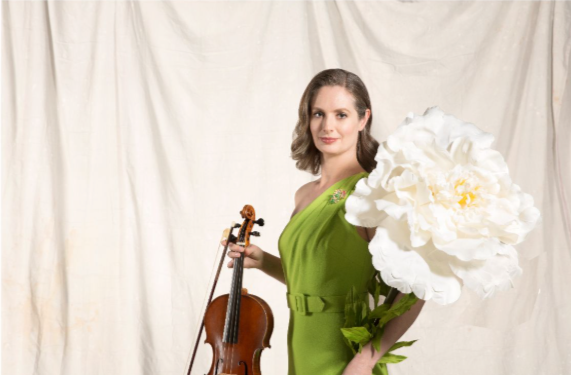
ARTISTS
Skye McIntosh, violin
Matthew Greco, violin
Rafael Font, viola
Daniel Yeadon, cello
PROGRAM
HAYDN
String Quartet Op. 77 No. 1 in G major
F.X. RICHTER
String Quartet Op. 5 No. 5b in G minor
MYSLIVEČEK
String Quartet Op. 3 No. 6 in A major 2nd movement Larghetto
WRANITZKY
String Quartet Op. 49 in D minor
BEETHOVEN
String Quartet Op. 18 No. 3 in D major
CONCERT DURATION:
Approx 120 minutes with a 20 minute interval
ABOUT THIS CONCERT
Haydn, Richter, Mysliveček & Beethoven
23 July - 2 August
Composers hailing from the now proud Czech Republic were surprisingly numerous in the 18th century and, while far from household names today, had a significant impact on some that are. These Bohemians were neither the free’n’easy chums who kissed tiny frozen hands in garrets nor the future pictorial romantics devoted to the fields and forests of their homeland. No, these guys skipped down the steps of their provincial alma maters straight onto express carriages bound for Austria, Germany or Italy, and never looked back.
Under their Germanified aliases, Franz Xavier Richter and Paul Wranitzky made good in Europe; the first as violinist/composer at the Mannheim court and the latter as Vienna’s most respected conductor (he premiered Beethoven’s 1st). In Venice then Rome, Josef Mysliveček so out-Italianed the Italians in spirited temperament (and libido) that they abandoned efforts to pronounce his surname and dubbed him il divino boemo (the divine bohemian). A dear friend and mentor to the young Mozart, their relationship touchingly survived the divino’s Lucifer-like fall from grace after a post-operative disaster left him with a Voldemortian visage and careening career.
The ensemble offers a tantalising degustation drawn from these expats’ insanely prolific works; a fascinating Richter quartet from 1757 that pre-dates Haydn’s patent on the form, a sweet palate cleansing Mysliveček Larghetto worthy of his (less nasally challenged) protégée followed by a thrilling and top-notch late quartet by Wranitzky. Love at first listen is guaranteed, so fear not!
There are old favourites too, by those who bore no trace of backwater mud on their boots, and were more than happy to wallow in Bohemian loot. The province’s Prince, Josef Franz of Lobkowitz was a sweet gentleman whose “foolish love of music” led to the creation of The Creation and many Beethoven masterworks, including his set of quartets Op.18.
The delightful 3rd of these is actually Ludwig’s first foray into the form perfected by his then aging teacher. Deceptively simple, you’d never think it would trigger in Haydn a fit of jealousy and self-doubt that led to his (contemporaneous) Op. 77 falling four works short of the six paid for by the prince. In his second to last quartet, you’ll find no evidence of waning powers, only consummate skill unmatched even by the brilliant upstart waiting in the wings. His short-changed patron could hardly complain upon hearing its sublime Adagio, Schubertian Menuetto and swirling folkdance finale.
Czech this one out.

PERFORMANCES & TICKETS
Saturday 25 July, 7pm
Port Macquarie
The Glasshouse
Get single tickets
Thursday 30 July, 7pm
Canberra
Gandel Hall,
National Gallery of Australia
Friday 31 July, 7pm
Berry
Berry Uniting Church Hall,
Albert Street, Berry
Saturday 1 August, 4pm
Southern Highlands
Bowral Memorial Hall,
Bendooley Street, Bowral
Subscribe to the Southern Highlands Season
Get single tickets
Sunday 2 August, 4pm
Sydney
The Neilson, ACO On The Pier,
Dawes Point
Subscribe to Sydney or any location
Get single tickets
18th Century Unpacked - 2
Thursday 23 July, 6pm
Sydney
The Friends Room,
State Library of NSW
Read More
Get single ticket
Wednesday 29 July, 7pm
Melbourne
Primrose Potter Salon
Melbourne Recital Centre









DEEP DIVE
Learn more about the composers and music in this performance from the following links:

CONCERTS 101: WHAT TO EXPECT
First time attending a concert and not sure what to expect? Don’t worry! Scroll down to find out about attending an AHE concert. If you have questions that you don’t see the answer to here, send us an email and we’d be happy to help. Contact one of our friendly team at: info@australianhaydn.com.au
-
Firstly, you should know there are no rules. Going to a concert can be a great time to glam it up. If that feels right, then go ahead – there’ll almost certainly be plenty of others dressing up.
It’s also totally fine to come in jeans – and plenty of people do. The only real “rule” is to wear something that’s comfortable.
-
Don’t worry – nobody is going to get into trouble for clapping in the “wrong” place. The only real rule is not to clap while the musicians are actually playing (as other people can’t hear them).
The thing to know is that applause conventions have changed over time. People used to talk all the way through the opera in the 1700s, and we don’t tend to do that now!
At AHE, the music we play will often come to the end of a section (known as a movement) with what feels like a ‘big finish’. It’s like the composer is begging you to respond. And in days of old, they may well have shouted or clapped or cheered at that point!
When that happens, and you “accidentally” clap and not many others do, you have done nothing wrong! Just sit back and let it all sink in. You may still feel the vibration of the music in the air, and it can be quite a magical moment.
The performers will be getting ready for the next movement, which may have a very different feel to it. That’s all part of the journey of the piece as a whole.
Think of it like a book, with each movement like a chapter. You save your Goodreads five-star review for the end – and that has now become the convention for clapping at concerts.
At the end of the work, there will once again be a lovely pause while the final notes die away.
Watch for the body language of the players and let that be your guide. The majority of people around you may also start clapping too – so that’s always a good sign to let go and express yourself.
You don’t have to hold back at all now! Feel free to clap as loud and long as you like, cheer or you can even stamp your feet on the floor while you are still seated if you really loved it!
Sometimes you’ll see people standing up and clapping too (called a standing ovation). You don’t have to do this, but when and if you do, just know that it’s the highest honour an audience can give the musicians and a sign of maximum appreciation.
Most of all – listen and enjoy!
-
Each performance has a detailed concert program that explains the history of the composers, the music and provides information about the musicians.
You can pick up a concert program at the performance or read it online a few weeks before the concert. Once, available, we upload it to our Concert Programs page and include it on the event page (above)
We also try to provide information about the music in the lead up to a concert on our website, social channels and via emails.
In our ‘Deep Dive’ section (also on this page for each concert), you will find links to various background information pages that will help to give you more insight into the works and composers on the program.
Be sure you have opted in to receive emails so that you get all the info.
-
Yes, depending on the venue. The availability of refreshments varies from venue to venue and changes from time to time.
Below is information about what is currently available at our own venues.
BERRY: In Berry, we have community-led catering which usually includes tea and coffee, wine, cakes and snacks served by our wonderful local supporters.
BOWRAL MEMORIAL HALL: Delicious pre-concert and interval homemade treats are provided by the CWA. Alcohol is not currently available. There are gluten-free options and you can pay by cash or card.
BURRAWANG, SCHOOL OF ARTS: In Burrawang, we have gorgeous community-led catering which usually includes tea and coffee, wine and snacks served by the wonderful hall committee.
CANBERRA: Wesley Music Centre. Interval tea and coffee is on the cards for this venue in the future!
CITY RECITAL HALL: In Sydney, the City Recital Hall operates a full service bar before the concert and at interval. You can even take your drink inside the concert! Note that the City Recital Hall is a cashless bar. More information on all the dining options and bars is available here.
LAKE MACQUARIE: Tea and coffee, wine and snacks available.
PORT MACQUARE: Tea, coffee and wine available.
-
Between pieces definitely. Our instruments aren’t amplified so we ask you to respect everyone’s experience and that you don’t talk whilst the musicians are playing.
-
Photos are fine between pieces and when the musicians are bowing at the end of pieces, provided the flash is off.
Our musicians are concentrating hard whilst they are performing though, so we ask that your phone is off and away during the performance itself.









